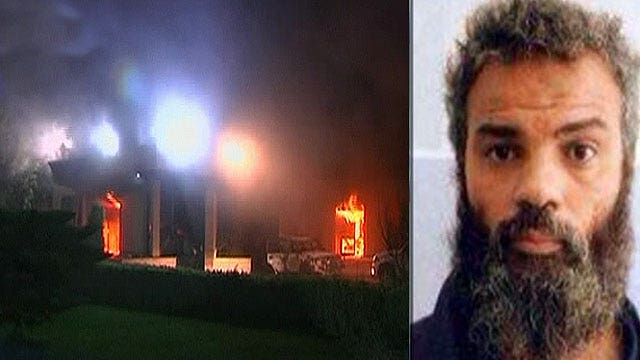Despite President Obama's promise to stay focused on hunting down those responsible for the 2012 Benghazi attack -- and despite a recent arrest touted as a major takedown -- sources say little has been done to nab the other suspects.
According to multiple sources on the ground, including some with direct knowledge of the operations to identify and hunt the Benghazi suspects, intelligence that could have been acted upon at times has been ignored or put on hold. Further, they say, the recent capture of Ahmed Abu Khattala -- now on a ship bound for the U.S., expected to arrive this weekend -- was an easy one.
"He was low-hanging fruit," one source told Fox News. "We could have picked him up months and months ago and there was no change, or urgency to do this now."
Former Ambassador Chris Stevens and three other Americans were killed in the Sept. 11, 2012, attack. Khattala was long thought to be involved, but is also considered by some to be rather low on the suspect list.
According to sources, the United States has a "target list" that initially contained about 10 suspects identified within days of the attack and eventually grew to more than 20 as American Special Forces conducted surveillance in and around Benghazi.
The four groups on the "target list" include Ansar al-Sharia, with the top target being the "Emir of Ansar al Sharia," Abu Sufian Ibrahim Ahmed Hamuda bin Qumu. He was a prisoner at Guantánamo Bay for more than five years and at the time was classified by analysts at the prison as "a probable member of Al Qaeda." Despite this significant threat to American security and allies, bin Qumu was released as part of an amnesty for militants in 2008. Sources told Fox News that intelligence has shown his involvement in the attacks, and actionable intelligence has for some reason been ignored.
In this same group, but at the bottom of the list, is Khattala.
Multiple sources with direct knowledge of the Benghazi attack also question why more of the investigation hasn't been centered on the Libyan landlord of the American facilities in Benghazi, Mohammad al-Bishari. Some in the region that night insist that al-Bishari "knows a lot more than he is letting on" and "is a key connection to everyone else that night" -- and should be at the very least intensely questioned about what he may know about the attack. Al-Bishari is also said to have bought a new hotel in Benghazi.
When contacted by Fox News, al-Bishari asserted his innocence and said that the United States still owes him money for the damage done to both the consulate and the annex the night of the Benghazi attack.
Others on "the target list" include Al Qaeda and "Libyan militants."
As Fox News previously reported last fall, American Special Forces on multiple occasions weren't allowed to go after harder and more important targets, even though they had multiple chances and opportunities to do so over the course of 16 months. The team, which was officially assigned around Tripoli to train Libyan Special Forces, was also tasked with finding the Libyan suspects responsible for the Benghazi attack. While a U.S. official told Fox News that the operators in question were not specifically tasked with finding the Libyan suspects responsible for the Benghazi attack, a source in the region countered the claims, saying "it's partly a cover."
Complicating the hunt, the U.S.-developed training camp on the outskirts of Tripoli was taken over a few months ago by militia groups who are now hoarding weapons, according to sources. The worry is this camp, abandoned by U.S. trainers, is being used to attack the new Libyan government and possibly western interests.
As for Khattala, the investigation has shown that he was essentially the ground force commander and is directly tied to Ansar al-Sharia and the broader network including Al Qaeda -- and there is direct evidence linking him before and after the attack. Khattala was also a member of the Libyan Shield, a militia formed to protect Benghazi while operating separate from Tripoli. Intelligence has shown that it and almost all the Libyan militias are tied to Ansar al-Sharia -- and commanders from some of these militias thought to be friendly and who have worked with American personnel have flipped sides and affiliated with Ansar al-Sharia.
"Ansar al-Sharia is saturating the whole region of eastern Libya with money, training and personnel. They are now the biggest organization in town," one intelligence source said.
"[Khattala] is the actionable guy and the target, but the [Al Qaeda] network is much larger. He is tied to terrorists throughout the region by our guys on the ground. Overall he is small potatoes to the larger Al Qaeda and terrorist network in the region," said another intelligence officer.





